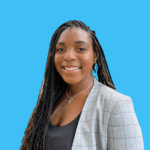403 years after the first enslaved people stepped foot on American soil, the United States has officially nominated the first Black female justice to the Supreme Court.
Now Justice Ketanji Brown Jackson represents not only a minority female breaking out of social barriers, but she represents the next generation of multiracial, LGBTQIA+, socially conscious, and educated with student debt loans to prove it.
Like KBJ referenced in her victory speech, she is an enslaved person’s dream. And Black people who grew up in the era of slavery abolitionism, Jim Crow, and the Civil Rights Movement probably never imagined a Black woman in one of the highest courts of the land.
This historical moment made me think about how exactly Black women grew the ladder of power in the federal system. In 1872, Charlotte E. Ray made history by becoming the first African American woman to become a lawyer in the United States.
In addition to Ray earning her degree from the Historical Black College Howard University, she also became the first Black woman to practice law in the U.S. after the District of Columbia Law association changed admission guidelines.
Nevertheless, Ray suffered racial and sexist biases, which forced her to close her practice not too long after opening. But not before she became the first African American woman to argue a case in the D.C. Supreme Court.
In the years to come, Ray would lay the groundwork for another Black woman on the east coast, Jane Bolin. Bolin grew up in New York, where she eventually became the first Black woman to graduate from Yale Law School in 1931. After graduation, Bolin, too, struggled to overcome racial and sexist biases before becoming the first African American woman to work in a corporate counsel.
Still, Bolin wasn’t done achieving greatness wherein, in 1939, she became the first Black woman to be sworn in as a judge in America.
KBJ’s proclaimed inspiration is Constance Baker Motley. She started as a law clerk for former Supreme Court Justice Thurgood Marshall and eventually worked herself up the ranks to become the first female attorney in the NAACP Legal Defense Fund.
In her tenure, she also argued 10 cases before the U.S. Supreme Court, nine of which she won, making her the first Black woman to argue and win a case before the court. At the same time, Motley worked on constitutional civil rights issues around the country; she represented one of the most prominent Civil Rights leaders in history, Dr. Martin Luther King Jr.
After leaving the NAACP in 1965, Motley didn’t stop achieving great things. One year later, she became the first Black woman to become a federal judge after her nomination from President Lyndon B. Johnson to the Southern District of New York.
Another historical Black woman who broke the glass ceiling is Texas Southern University graduate Barbara Jordan. Mostly known for her work as a legislator, Jordan became the first Black woman elected to the Texas Senate, fought back against redistricting, and discrimination, and spoke up about local issues impacting her community in Houston, Texas.
In 1971, Jordan continued her political career on the federal level after beating out two white men in her race to become the first Black woman elected to Congress from the South. Her resilience on equality, voting rights, and a simple better life for all Americans led her to the House Judiciary Committee. She is also known for a historic speech calling for former President Richard Nixon’s impeachment.
Jordan also sponsored legislation that expanded the 1965 Voting Rights Act and after leaving Congress started another career as a professor of national policy at the University of Texas in Austin.
Equally important, all these women’s experiences in their positions were unique and individual to their values as a person while at the same time dismantling systems of racism, sexism, and capitalism.
Kennedy is a recent graduate of the University of St.Thomas in Houston where she served as Editor-in-Chief of the Celt Independent. Kennedy brings her experience of writing about social justice issues to the Texas Signal where she serves as our Political Reporter. She does everything from covering crime beats, Texas politics, and community activism. Kennedy is a passionate reporter, avid reader, coffee enthusiast, and loves to travel.





